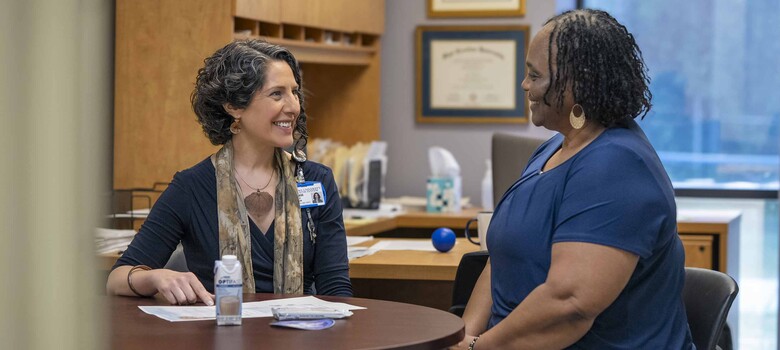 From the DukeHealth.org archives. Content may be out of date.
From the DukeHealth.org archives. Content may be out of date.
Thyroid Cancer: Successful Treatment Requires Experience

Thyroid cancer is rarely fatal, but it is still a frightening diagnosis. Learn why successful treatment of thyroid cancer requires knowledge and experience.
Treating thyroid cancer requires delicate surgery, and its rate of recurrence (requiring more surgery) can be high. Thyroid cancer also seems to be much more common than it used to be: the incidence of this cancer has increased 240% in the last two decades. No one knows exactly why—environmental factors, radiation exposure, diet, or something else altogether.
Too Busy for Cancer
Trishia Hagerman-Payne, a physician assistant in in West Virginia, is no stranger to living with disease, professionally or personally. She has endured a cascade of health crises: endometriosis, polycystic ovary syndrome (PCOS), kidney stones, a heart rhythm disorder, an unknown bleeding disorder, and Graves’ disease. But Hagerman-Payne has learned to take them all in stride. “For all my conditions I always have approached it like, God gave me something, I can’t dwell on it; I move on,” she says. And she often conquers: although her endometriosis and PCOS should have made conceiving a child impossible, she is the proud mother of a three-year-old son. “He’s my miracle baby,” she says.
Around Christmas a few years ago, Hagerman-Payne found an enlarged lymph node under her ear. “My ear kept popping, but at first I didn’t pay any attention. I thought it was allergies,” she says. “I’m a busy person—I have a three-year-old son, I work all the time, I never sit down. And when you work in a medical field, you don’t get sick. So I just kept going.”
But the nodule didn’t go away, even after she had been treated with five rounds of antibiotics for strep throat and pneumonia. So she had it checked out. It was thyroid cancer. “I had a biopsy and scan done in Johnson City, Tennessee, and they said I lit up like the stars. They wanted to schedule surgery immediately with a local surgeon, but I said no. I had my assistant at work book an appointment at Duke right away.”
Appropriate Aggressiveness
The thyroid sits at the base of your throat, a butterfly-shaped gland hovering just above your collarbones. It releases hormones that are essential to metabolism and the function of many organs. Thyroid dysfunction is very common, especially among women, but it isn’t usually a risk factor for developing cancer. The key risk factor is developing nodules in the thyroid, much like Hagerman-Payne’s.
The primary treatment for thyroid cancer is surgery to remove the thyroid gland and any affected tissue around the thyroid, says Duke endocrine surgeon Sanziana Roman, MD. “The better your surgery up front, the better you’ll do long term.” Thyroid cancer very commonly spreads to nearby lymph nodes, so an important part of the surgery is identifying and removing as much of the cancer as possible, Dr. Roman says. “The surgeon’s aim is to reduce the chance that we miss cancer right now, so that you’ll be less likely to have regrowth and need another surgery later. But we don’t want to do unnecessary or excessive surgery because of the potential complications.”
The surgery is a delicate one because of the fine and important structures near the thyroid. The nerves that control vocal function run right through it, and the parathyroid glands, four delicate glands the size of an eraser tip that are essential for regulating the body’s calcium levels, float on its surface. “The chances of long-term complications, such as hoarseness or imbalances in calcium levels, are serious and life-changing,” Dr. Roman says. “And so is recurrence of the cancer. So we really don’t want to do either too much or too little surgery.”
Look for Experience
The key, Dr. Roman says, is to find an experienced surgeon. And she means really experienced. “There’s no magic number of surgeries you can do to achieve a particular expertise,” Dr. Roman says. “Frankly, the more thyroid cancer surgeries you do, the better you are. And the experience is not just about technical skill; it’s also about understanding the disease process and being able to judge what surgery will be best for a particular patient.”
Dr. Roman says that whenever possible, Duke surgeons perform minimal access thyroidectomies. “That means we use a small incision—about 3 to 3.5 centimeters—and we place the incision in a natural neck crease. We’re very careful about how we close the incision, so that it heals very nicely and blends and disappears over the course of the year.” Larger incisions are sometimes necessary if the cancer is extensive or the thyroid is enlarged.
Duke surgeon Randall Scheri, MD, says the greatest risk involved in thyroidectomies is to the nerves that control the vocal cords. “In experienced hands, it’s very rare for injury to occur—it’s about a 1% risk or less,” he says. “For inexperienced surgeons, the risk is higher. The same is true for the parathyroid glands, which share the same blood supply as the thyroid.”
Adds Duke surgeon Julie Ann Sosa, MD, who specializes in thyroid cancer: “A patient’s outcome is directly linked to the expertise of her surgeon. At Duke we have three very high-volume surgeons.” Duke’s three thyroid cancer surgeons each have done thousands of these surgeries, and their research on thyroid cancer and patient outcomes is driving the field forward. In fact, Sosa writes the national guidelines for the treatment of thyroid cancer.
Assembling the Team
Dr. Scheri explains that Duke treats thyroid cancer as a multidisciplinary disease, and so a team of specialists brings in a wealth of expertise to help choose the best surgery for each patient. They use ultrasound neck mapping and molecular profiling to determine the location of the cancer and the specific tumor type. “We surgeons often put our heads together for difficult cases, to bounce ideas off each other or even to help out in the operating room,” Dr. Scheri says.
A team approach was especially important in Hagerman-Payne’s case. Because of her complicated medical history, an already complex surgery was going to be more complicated. Her heart rhythm disorder limits the medications that she can be on, and her bleeding disorder makes any surgery a riskier prospect than usual. And on top of all that, her cancer had spread extensively. “You take a difficult operation and a big, bad case of cancer and add all these medical complexities,” Sosa says, “and it really required a team approach. Trishia met with the full complement of Duke physicians—even down to our genetic counselors.”
Hagerman-Payne’s surgery took seven hours, but she did beautifully, according to Sosa. Despite her complex medical history, she had no complications. “I had a positive outlook,” Hagerman-Payne says. “On the day of the surgery I was nervous, but I had a lot of faith and trust in Dr. Sosa. I knew she knew what she was doing.
“I’ve done exceptionally well,” she continues. “I had almost no pain at all, and no difficulty getting around afterward.” She was out of work for two weeks, and because her cancer had spread to her lymph nodes, she’s participating in postoperative treatment regimens. “My family has been my rock,” she says. “And my colleagues, too—they become like your family.”
The surgery left a 4.75-inch scar, but Hagerman-Payne says it’s subtle. “I wore my hair up yesterday, and you could hardly tell it was there,” she says. “It’s a beautiful scar.”
Who's at Risk for Thyroid Cancer?
- Thyroid cancer is the most common type of endocrine cancer, and the most common cancer in women younger than 35. But it can also strike men and older people.
- Thyroid dysfunction is also very common, especially in women, but it doesn’t affect your risk for developing cancer, except in people who have Hashimoto’s thyroiditis.
- What does affect your risk is having nodules (small lumps) in your thyroid. Thyroid nodules are very common; almost 50% of women will develop a nodule by age 55. Only 5% to 7% of those nodules, however, will be cancerous.
- Although thyroid nodules and cancer are more common in women, a man with a nodule is more likely to have cancer.
- Odds of nodules go up with age, and odds that a nodule is cancerous also go up with age.
A Cancer on the Rise
Is thyroid cancer more common because we’re better at detecting it? Roman says that’s one likely explanation, but there are other factors at play. The cancer is being diagnosed more frequently worldwide, even in countries without advanced medical diagnostic tools; also, tumors of all sizes are becoming more common. “It’s not that we’re just getting better at finding tiny tumors earlier,” she says. “We believe this type of cancer is becoming more common.” More research needs to be done to identify the complex reasons for the increase in thyroid cancer.
Relaxing Is Important, No Matter What
After a cancer diagnosis, your stress levels may rise, and after treatment, you may not feel like being active or exercising.
Duke Cancer institute support services has designed programs suitable for nearly every patient. For example, tai chi, a slow, deliberate series of movements that originated in China, not only encourages low-impact movement, but it also helps to dial down stress levels. tai chi classes are available twice a month for patients, caregivers, volunteers, and staff members at no cost.
“Many patients are fatigued, but actually it helps to exercise gently to reduce fatigue levels in a noninvasive way, which tai chi provides,” says Kristy Everette, who is coordinator of oncology recreation therapy at Duke. “Recently, one patient said he was too tired from walking to the tai chi class to participate, but the leader, who is an oncology nurse, showed him how to participate while seated. many people who say they will try the class for a few minutes actually exercise the whole time. many comment on how fast the time goes by.”
Find out more information on classes offered at the Duke Cancer Center.


